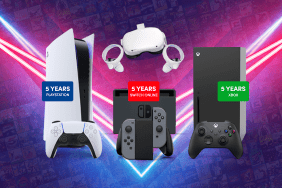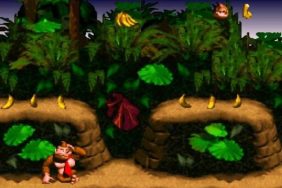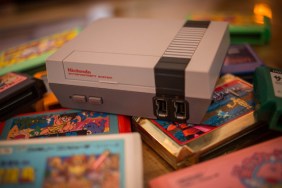7: Mortal Kombat vs. Street Fighter

The Rivalry
Two fighting giants with completely disparate tones, Street Fighter and Mortal Kombat were both iconic series of the ’90s.
While Street Fighter revolutionized the genre with Street Fighter II, bringing the arcade experience to home consoles and almost single-handedly spawning the fighting game community, Mortal Kombat pitched itself as the fighting game for the “cool kids.” With its abundance of blood, violence and over-the-top humor, Mortal Kombat‘s mature themes actually led to the creation of the Entertainment Software Rating Board (ESRB) which is now known for putting those little “Teen” or “Mature” ratings on the boxes of video games.
Despite their differing takes on the genre, both Street Fighter II and Mortal Kombat were immensely competent games in their own right. While SFII nailed bringing one vs. one fighting to consoles, Mortal Kombat dominated the arcades with people lining up to see who knew the codes required to activate Fatality moves.

However, both series are not without their faults. Developer Capcom practically made Street Fighter a parody of itself by refusing to release straight sequels, instead opting to add suffixes to its existing games after balancing them, as evidenced by the existence of games such as Street Fighter II: Turbo, Hyper Street Fighter II: The Anniversary Edition, Street Fighter III: 2nd Impact and many, many more. On the other hand, the quality of the Mortal Kombat series steadily declined leading to a poor transition to 3D gaming, starting with the average Mortal Kombat 4 and leading to the likes of Mortal Kombat: Deception, Mortal Kombat: Deadly Alliance and the woeful Mortal Kombat vs. DC Universe.
There’s no ignoring the fact that thousands of dollars are still being wagered on Street Fighter II matches.
Fortunately both series eventually found their way once again during the last console generation, with Capcom releasing the excellent Street Fighter IV and Mortal Kombat creator going on to form NetherRealm Studios in order to reboot the MK franchise in 2011, which received similar praise and put many other fighting series to shame (including Street Fighter) by including a worthwhile story mode.
The Winner
Both series have experienced their highs and lows, though Street Fighter has been much more consistent than Mortal Kombat over the years and remains the most important series in the fighting game community. Though both are distinguished series in their own right, there’s no ignoring the fact that thousands of dollars are still being wagered on Street Fighter II matches, so Capcom’s classic fighting franchise comes out on top here.
6: PS4 vs. Xbox One

The Rivalry
The current battle for home console supremacy is being waged between the PS4 and Xbox One. Though they’re both still within their first year of release, the sales hype leading up to the launch of both systems was handled in a completely different way by Sony and Microsoft, and as likely led to Sony reasserting its dominance after the PS3 struggled to keep up with the Xbox 360 and Wii in its formative years.
All Sony had to do was market the PS4 as the anti-Xbox One to win over the E3 audience.
Microsoft pushed a huge amount of emphasis on the Xbox One being an all-in-one entertainment center, speaking of the positive impact the revised Kinect 2.0 would have on the console and tellingly targeting it at a demographic that wasn’t necessarily interested in video games, but rather wanted to buy an entertainment center that could play video games on top. While the company would later assert that this wasn’t the case, they made the ill-advised decision to put a huge emphasis on its TV integration during its unveiling, pushing games into the background of its presentation.

A number of their proposed policies in regards to the Xbox One also didn’t help their case. Initially stating the Xbox One would require an online check-in every 24 hours and that games could only be downloaded one time per system, thus rendering used games obsolete, the company was forced to do a huge amount of back-tracking in order to get consumers back on their side. However, the damage had already been done, and during Sony’s E3 2013 reveal of the PS4 all they essentially had to do was market the console as the anti-Xbox One in order to win over the audience.
And win them over they did. With the PS4 achieving record-breaking sales worldwide, Sony left Microsoft in the dust at launch. That’s not to say that the Xbox One didn’t perform well – given the circumstances prior to its launch, it actually performed rather admirably – but the PS4 has a tremendous lead in terms of its install base, and though the console is currently lacking in software it’s hard to foresee Microsoft outperforming it any time soon.
The Winner
Given that both consoles are still within their first year of release it is therefore impossible to say who has come out on top just yet. While all signs point to the PS4 right now, who knows what lies around the corner for both companies?
5: Rock Band vs. Guitar Hero

The Rivalry
While there are murmurs that the genre could see a revival soon, music games are all but dead right now. Back in the late ’00s it would have been difficult to convince anyone that the gaming industry would eventually stop overflowing with rhythm action titles, though, as Rock Band and Guitar Hero were going toe-to-toe with their pricey peripherals and ever-expanding playlists of decade-spanning tracks.
At the peak of the genre’s popularity Activision sold a whopping 3.5 million units of Guitar Hero III, rivaling the Call of Duty franchise as the publisher’s premier franchise. While Guitar Hero only offered a guitar peripheral with the game, developer Harmonix introduced the full band experience, bringing in drums, bass and microphones to the actions and leading many Guitar Hero fans astray in the process.

Such was the intense popularity of the music game genre that the obsession was even parodied by South Park, with the show poking fun at Guitar Hero players’ lack of proficiency with actual instruments when compared to their skills with their plastic counterparts.
Guitar Hero: Warriors of Rock shifted just 7400 units in its first week on sale.
Unfortunately, both Rock Band and Guitar Hero suffered similar fates, as Rock Band 3 and Guitar Hero: Warriors of Rock received incredibly poor sales, with the latter shifting just under 7400 units in its first week on sale in the UK. The peripherals were put back on the shelves (or put on eBay) and the genre which had once been so prolific was left to die a miserable death.
The Winner
In the end, neither Rock Band nor Guitar Hero really won. While their unique take on the music genre and surprisingly popular peripherals certainly made an impact on the gaming industry for a short while, their success was short-lived. Still, given Guitar Hero III‘s immense sales, it achieved more during its time at the top than the Rock Band series did, so the nod is going to have to go to Activision’s ill-fated rhythm action franchise.
<< Next Page: Huge Console Rivalries >>








